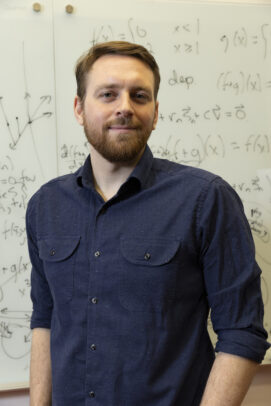Mathematician Matthew Harrison-Trainor receives Sloan Research Fellowship

Matthew Harrison-Trainor, a mathematician at the University of Illinois Chicago, has been awarded the Sloan Research Fellowship, one of the most prestigious awards for early-career researchers.
Harrison-Trainor, an assistant professor in the Department of Mathematics, Statistics and Computer Science, was one of 126 researchers chosen for the 2024 class of Sloan Research Fellows announced Tuesday, Feb. 20. He is the 21st UIC faculty member – and the 16th from mathematics – to receive the honor.
The fellowship gives Harrison-Trainor a two-year, $75,000 award to advance his research. It also inducts him into a select group that includes 57 Nobel Prize recipients and 17 winners of the Fields Medal in mathematics.
Harrison-Trainor’s work sits at the intersection of mathematics and computer science. It draws on mathematical logic and computability theory, a field that early computing pioneer Alan Turing originated.
“A lot of computer science is about how efficiently things can be done. What I do is ask, ‘Can you do it at all?’,” Harrison-Trainor said. “We can imagine that in the future we will make better computers. But there are still problems that, no matter how good our computers are, we’re still not going to be able to do. Computability theory is about finding those boundaries.”
In theoretical computer science, mathematicians study the complexity of computational problems, determining if they would be solvable in a reasonable length of time. Harrison-Trainor’s work goes a step further to determine if those problems are solvable at all.
In mathematics, researchers try to break complex phenomena into simple components to explain how they work, such as proving whether two complex geometric spaces are identical based on only a small set of observations. But sometimes they hit boundaries where the components can’t be simplified any further. Harrison-Trainor’s work can help people pursuing these problems determine if they’ve arrived at the limit of explainability.
It’s like trying to explain the functions of the human brain by observing the activity of every individual neuron, Harrison-Trainor said. Such a model would not only be computationally intensive – or impossible – it would fail to improve our understanding of how the brain works. “That isn’t an explanation; it doesn’t simplify what’s going on,” Harrison-Trainor said.
For certain mathematical problems, “you can actually prove that there’s no simple understanding,” Harrison-Trainor said. “It’s not just that we haven’t come up with one yet, you can show that we’re never going to be able to.”
Harrison-Trainor credited the UIC mathematics community and its historical strength in mathematical logic with supporting his Sloan fellowship application. He’s also a part of the mathematical computer science group, which brings together faculty and students working on problems at the intersection of mathematics and computer science.
“There’s a strong community in the study of logic in the Midwest, and UIC is part of that,” Harrison-Trainor said. “It’s a strong department, and when you have strong people, more good people and students come in.”
